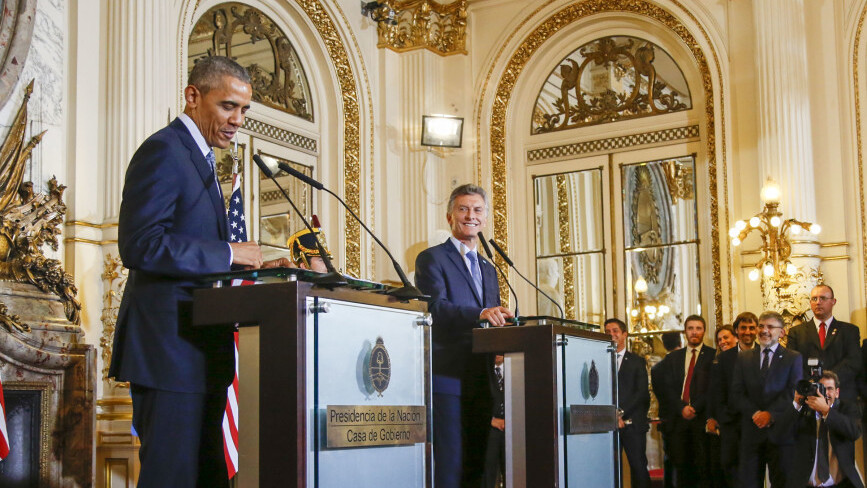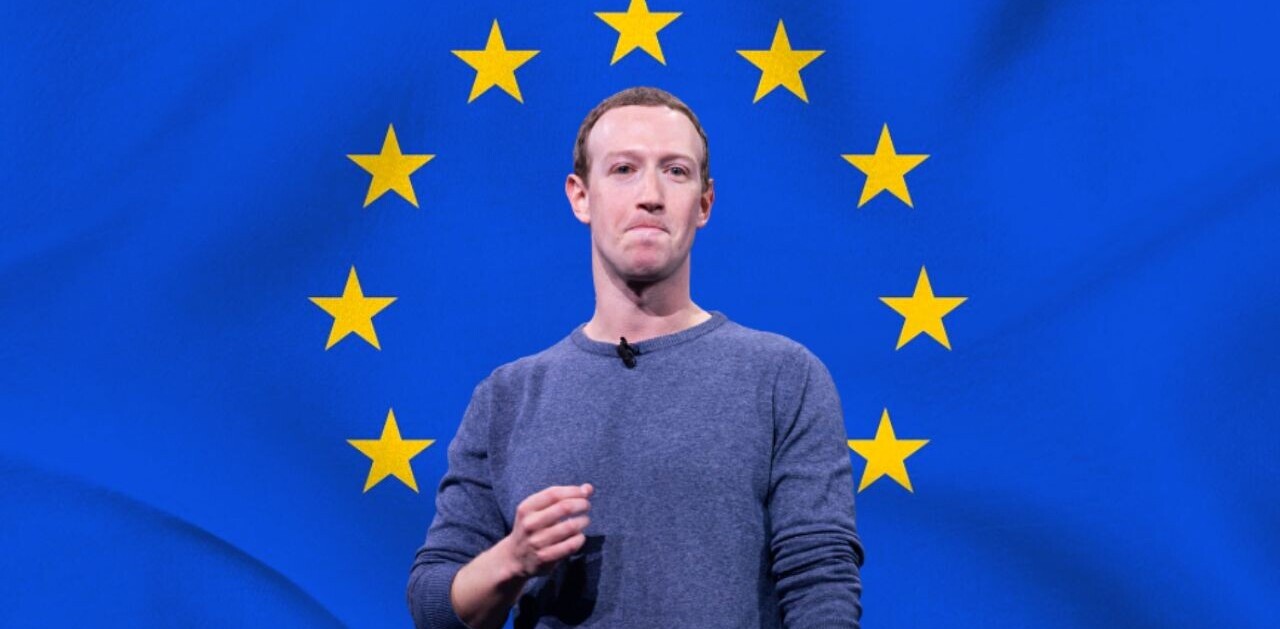
Politics played a larger-than-usual role in Latin America’s tech scene last month, either directly or indirectly, for better and for worse. From Obama’s visits to Argentina and Cuba to Uber’s troubles, here’s the news you don’t want to miss:
Big players
Facebook’s vice president for Latin America Diego Dzodan was briefly arrested in Brazil due to a legal case involving Facebook-owned WhatsApp. Facebook was accused of repeatedly disobeying a court order to help investigators identify a WhatsApp user involved in a drug case; according to the company, it doesn’t have access to such encrypted data, which makes compliance impossible. Dzodan said he had been treated with respect and doesn’t expect the incident to slow the company’s expansion in Brazil.
Uber is also facing legal troubles, this time in Colombia, where the Colombian superintendent for ports and transport fined it for 450 million Colombian pesos (around $140,000), deeming the service unauthorized. This adds up to the issues the company is facing in the country, including severe intimidation from taxi drivers.
Meanwhile, Uber launched one-way cross borders trips from California to Tijuana, as well as an UberTOUR service to the pre-Columbian ruins of Chichén Itzá, Mexico. As expected, it started operating in Recife and started hiring drivers in Buenos Aires.
Google made a $1 million donation to UNICEF to help fight the expansion of the Zika virus in Brazil and beyond. The outbreak is causing increased concern amid visitors ahead of the Rio 2016 Summer Olympics, which led the Health ministry to announce the launch of a dedicated app in seven languages. Known as ‘Guardiões da Saúde'(Health Guardians) in its Brazilian version, it is meant to help the general public identify possible symptoms of the disease.
On a related note, Brazil’s Justice ministry is launching a competition for mobile apps aimed at fighting corruption, an issue that has been at the center of public debate in the last few months. The three best apps will win a R$10k grant (around $2.7k USD).
Back to Google, the company announced a partnership with Mexican co-working space Centraal, which will join its Google for Entrepreneurs’ Passport program. Members of any Google Campus and any other of the program’s participating venues around the world will be able to work for free from Centraal’s location in Mexico City, while Centraal’s clients will get similar benefits and some extra perks.
Google also informed that will connect Rio de Janeiro and São Paulo with an undersea cable developed in partnership with Campinas-based company Padtec. The new fiber optic link will be 390 kilometer long and is nicknamed ‘Júnior’ after Brazilian painter José Ferraz de Almeida Júnior (1850-1899). It is scheduled to start operating in the second half of 2017, in connection with the other two cables previously announced by Google to improve connectivity in this region.
Additionally, YouTube Kids rolled out in Argentina and Mexico, the platform’s first venture into Spanish-speaking territory. The US version of the app has been downloaded more than ten million times. It will be competing with Movile’s popular brand PlayKids, which recently released three new apps.

The Obama effect
President Obama’s official visit to Argentina included a tech agenda: among other activities, he took part in a meeting with young entrepreneurs. President Macri also decided to promote local talent by giving his US counterpart one of the bikes developed by Argentine startup Brooklyness, a Start-Up Chile alum.
Despite its highlights, this trip was largely overshadowed by Obama’s visit to Cuba, a sign of changing times and relaxed restrictions that led many US tech companies to announce plans for the island. For instance, Airbnb is now expanding its service to allow visitors from all nationalities to stay with local hosts, piggybacking on the existing concept of ‘casas particulares.’ As for PayPal, it informed that it would roll out its Xoom’s money transfers in Cuba.
Still in the payments space, Stripe announced it would make its new service Stripe Atlas “available to entrepreneurs in one of the only countries it didn’t previously serve: Cuba.” Meanwhile, Google reaffirmed its plans to build out broadband and Wi-Fi infrastructure on the island, while Swedish music service Spotify opened up its service to Cuban users.
M&A
Brazil-born global IT firm Stefanini announced the merger of its Stefanini VANguard subsidiary with Scala IT, one of IBM’s main software partners in Latin America. Earlier this year, Stefanini had acquired Colombian ERP company Sysman. Despite the challenging economic environment, Stefanini is paying attention to new opportunities and wants to steadily invest in innovation,” its CEO Marco Stefanini declared (translation ours).
Brazilian e-commerce group Netshoes acquired São Paulo-based retailer Shoestock for an undisclosed amount. The deal’s purpose is to reinforce Netshoes’ fashion subsidiary Zattini, an online fashion retailer selling clothing, shoes and other accessories, competing with Rocket Internet’s Dafiti. Shoestock was founded in 1986 and had folded in late 2015 due to financial difficulties.
Miami-based marketing agency Nobox was acquired by AgênciaClick’s former CEO Pedro Cabral and Alexandre Hohagen, previously Google’s and Facebook’s VP for Latin America. Hohagen also became Nobox’s CEO. Terms of the deal weren’t disclosed.
Brazilian food delivery heavyweight iFood made its fifteenth acquisition in only two years by overtaking SpoonRocket‘s logistics infrastructure. It also hired SpoonRocket’s former CTO, with hopes of optimizing its delivery time to reinforce its market position across Latin America. SpoonRocket was launched in 2013 with plans to deliver healthy meals to the San Francisco Bay Area, Seattle and San Diego, but ended up saying goodbye to its users last month after failing to stay ahead of its competitors. “[The founders] were looking for a buyer to keep it alive in the U.S., but they could not get it together,” iFood’s CFO Carlos Eduardo Moyses told TechCrunch.
Express delivery startups Rapiddo and 99Motos merged to operate together under Rapiddo’s brand. Like above-mentioned iFood, Rapiddo is part of Movile‘s portfolio. It operates in Brazil’s main cities and also has an indirect presence in Colombia, where it invested in its local counterpart Mensajeros Urbanos.
Argentine entrepreneur Gaston Irigoyen announced the acquisition for an undisclosed amount of his DIY-focused startup Guidecentral by eHow competitor wikiHow, which hopes it will help improve its mobile experience. Guidecentral will remain a separate brand, maintaining its own apps and website, but still hopes to reach a larger audience thanks to this deal.
“Our community will benefit greatly from the acquisition, Irigoyen said. “Our makers and their fantastic projects will reach up to 100 million wikiHow users moving forward. That’s massive for an indie creator working out of her home or workshop.” Guidecentral had raised funding from Enterprise Ireland, South Ventures and NXTP Labs (disclosure: NXTP Labs is an investor in my startup, MonoLibre).

Funding rounds
Argentina-based peer-to-peer lending platform Afluenta raised an $8 million Series B round from the International Finance Corporation (IFC) and Elevar Equity, each of which brought 50 percent of the investment. The startup plans to use it to fuel its growth and expansion in Argentina, Peru, Mexico, Colombia and Brazil.
Scheduling platform for beauty salons Beauty Date raised R$28 million (around $7.6 million USD) from Valor Capital Group at the beginning of the year. The deal was disclosed in March alongside the announcement that Beauty Date had acquired AZ Soluções, a software company developing solutions for beauty salons. One of Beauty Date’s main competitors in Brazil is Rocket Internet’s Vaniday.
Brazilian edtech startup Passeidireto.com received a R$23 million investment ($6.3 million USD) from US edtech heavyweight Chegg, Bozano Investimentos, Redpoint e.ventures and Valor Capital. The company plans to use this funding to expand its product catalogue and improve its UX, both on its site and on mobile.
Brazilian shipping startup Mandaê raised a $2.5 million Series A-1 round led by Qualcomm Ventures with participation from existing investors Monashees and Valor Capital Group, bringing its total funding to $5 million. Mandaê’s mobile and desktop apps target both individuals and small businesses, giving them access to private transporters that were previously limited to serving big-volume clients (a specificity of the Brazilian market).
“My co-founder and I ran an e-commerce business prior to Mandaê, and we can empathize with the small business owner who spends 2-4 hours each day on fulfillment and shipping. We used to do this as well. Mandaê is the logistics solution we would have wanted for ourselves,” said Mandaê co-founder and CEO Marcelo Fujimoto.

Argentine freelancer marketplace Workana raised a $2 million investment to make new hires and improve its platform, with a focus on its mobile version. The funding comes from Mexican job hunting marketplace OCC and SEEK, an Australian group with a special interest in Brazil, a market that accounts for half of Workana’s business. Workana was the winner of TNW’s Latin America startup competition in 2012.
Portuguese firm Smarkio raised a R$ 6,5 million investment ($1.8 million USD) for its Sales, Marketing, Integration & Optimization’ solution from Portuguese fund Revitalizar Norte. Smarkio has offices and tech operations in Brazil, and plans to use its funding to grow its presence in Brazil, Portugal, Spain and Colombia. It belongs to Impacting Group, a holding that also owns Adclick, Beeleads, and Emailbidding.
Loan brokerage platform FinanZero received a $1.2 million investment led by Vostok Emerging Finance to launch in Brazil, its first market, with an initial focus on car purchases. According to VC firm Webrock Ventures, which is also a co-investor in the deal, “the business combines aspects of loan comparison, lead generation and consumer loan brokering.”
Mexican mobile company Weex received Series A funding from Mexican fund ALLVP for its MVNO, which is targeted at millennial users. Weex is part of the Coca-Cola Founders platform. Its co-founder Ricardo Suarez previously founded Yumbling, a so-lo-mo app acquired by Grupo Expansión in 2013.
Brazilian cyber security firm Aker Security Solutions received an investment round from Invest Tech through its Capital Tech II fund. The company is considering using some of its new resources to open subsidiaries across Brazil and add team members to its staff of 110.
Colombian office supplies online retailer OFI.com.co raised an undisclosed amount of investment from Medellin-based VC fund Velum Ventures. The company is part of the Endeavor network and had previously participated in 500 Startups’ Miami Distro accelerator program. It had raised seed funding from South Ventures, angels from several countries and Colombian agency iNNpulsa.
Brazilian fintech startup Vindi raised R$1.865 million (around $500k USD) from the Criatec2 fund, a public-private partnership managed by Bozzano Investimentos. This is the second financing round raised by this B2B company, which provides businesses with a management service for recurring payments. Its clients include Buscapé, Serasa Experian, Smartfit and Thomson Reuters. According to its CEO Rodrigo Dantas, the company now has its eyes on the Latin American market.
Expansions and downsizing
HBO announced the upcoming launch of its standalone streaming service in Argentina and Brazil, scheduled to take place later this year. HBO Go is already available without a cable subscription in Mexico and Colombia.
Brazil’s UOL BoaCompra expanded its gaming-focused digital payments service into Chile, following similar launches in Brazil, Mexico, Peru, Colombia, Portugal, Spain and Turkey. It also launched a portal listing online games accepting local payments in the country. “A staggering 71 percent of those online in Chile do not have access to international credit cards to make purchases online, as Chileans primarily use local cards and cash-based payment methods,” said Fernando Estevez Vazquez, Director of Global Strategy & Payments at UOL BoaCompra. “Additionally, Chile’s internet penetration rate is markedly higher than its neighboring countries, demonstrating high demand for digital products and further growth in e-commerce with a good network and affordable prices.”
As for Indian healthcare company Practo, it landed into Brazil and announced that its Practo Ray and Practo Search services would be available both in Brazilian Portuguese and English. The startup has raised more than $124 million in funding, including a Series C round led by Tencent with participation from Google Ventures, Sequoia, Yuri Milner and others.
On the other hand, Rocket Internet’s ridesharing venture Tripda closed down, citing operational costs. In its two years of existence, the company had expanded into several markets, including Latin America where it had rolled out into Argentina, Brazil, Chile, Colombia, Mexico and Uruguay.
Additionally, Microsoft announced the shutdown of its 27 of its 47 retail stores in Brazil, less than a year after their inauguration. “Together with its franchisees in a strategic decision for the channel, Microsoft confirms the closing of certain physical stores under the brand Microsoft Store – Authorized Reseller in Brazil,” the company informed.
More acceleration and incubation
Start-Up Chile held a Demo Day for its Generation 14, which doubled as a competition won by Venezuelan edtech startup, PleiQ, which developed an AI-augmented toy for preschoolers. Start-Up Chile’s pre-accelerator for women entrepreneurs The S Factory also held a pitch finale, whose first place went to Canadian entrepreneurs Andrea Palmer with her “Reveal” project, a device developed by Awake Labs to measure the level of anxiety of people with autism. The S Factory will soon become its next batch, whose participants will be selected among more than 500 applications from 40 countries.

Puerto Rican initiative Parallel18 unveiled the list of 38 startups (including 12 local ones) selected to take part in its inaugural edition. Participating teams were shortlisted among 415 applications and hail from nine countries. Each of them will receive a $40k equity-free grant to participate in the five-month program, whose executive director Sebastian Vidal was previously part of Start-Up Chile’s executive team.
Additionally, Minas Gerais’ startup program SEED is back on track and ready to welcome its third batch of companies, which will consist of 40 participating teams selected among some 1,400 applications. Four of them come from Chile, three from Argentina and three from the US, with the remaining ones hailing from all across Brazil.
US non-profit digitalundivided announced it will open an innovation center in Atlanta, GA this summer. The BIG Innovation Center will be targeted at Black and Latina founders. It will host several mentoring and education activities, including a four-month long acceleration program with seed funding from the Harriet Angels syndicate.
Latin American marketing-focused accelerator INDY is reviewing applications to select five participants its six-month program, which is scheduled to start in May. INDY is based in Puerto Rico and led by award-winning senior advertising executives Jaime Rosado and Antonio Duarte, founder of marketing firm DuartePino. “We believe businesses must be customer-centric to be successful, and this also applies to startups, which can uncover meaningful insights through marketing processes that will help develop their brands and connect with customers,” Duarte said.
Mexican-American entrepreneur Bismarck Lepe is launching the Wize Fund, a seed fund for Mexico-based startups with an initial focus on entrepreneurs coming out of his SaaS company Wizeline. The announcement was made during the grand opening of the company’s new 20,000 square foot office in Kodak’s former Guadalajara headquarters. “Guadalajara today is what Bangalore was in the early 2000s. Now, Bangalore has five unicorn companies,” said Lepe, whose previous company Ooyala was acquired by Telstra in 2014.
Good reads from across the Web:
- 17 Things You Need to Know Before Doing Business in Cuba [Entrepreneur]
- Casa Co: el albergue de los emprendedores [La Tercera, in Spanish]
- El mexicano que se ‘arriesga’ por la industria del venture capital en México [Expansión, in Spanish]
- El móvil va lento en América Latina [El País, in Spanish]
- How I spent 24 hours on Cuban Wi-Fi [Miami Herald]
- How to Hack an Election [Bloomberg]
- Is Miami On The Rise? Real Progress Comes From Clear-Eyed And Honest Self-Assessment [Pulse]
- Latin America’s Obsessed With This Music Service Run From an English Attic [Bloomberg]
- Miami Company Apretaste Helps Cubans Access Internet Through Email [Miami New Times]
- Strengthening the Ecosystem of Startups in Latin America [Techstars]
- Tech entrepreneurs from Latin America overcome unique challenges to build innovative startups [Geekwire]
- Weak Economic Climate Stokes M&A Activity in Latin America [Nearshore Americas]
Read next: Tech in Africa: A change in Uber’s philosophy, Africa’s first unicorn, and more
Image credit: Casa Rosada
Get the TNW newsletter
Get the most important tech news in your inbox each week.




